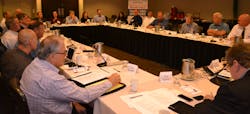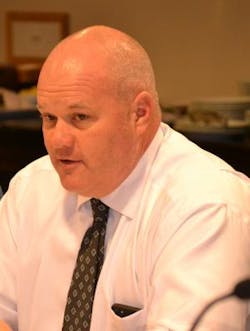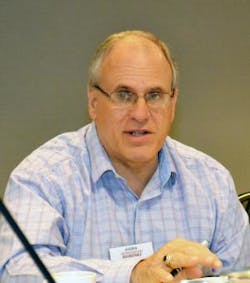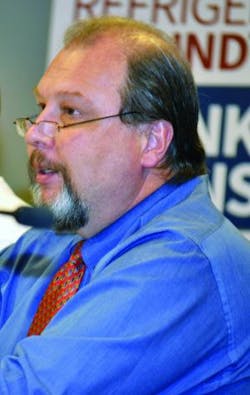Refrigeration: Meeting Labor Challenge a Tough Job
For six consecutive years, the ContractingBusiness.com “Refrigeration Roundtable” has brought commercial refrigeration contractors and supermarket executives together for a focused discussion of topics related to supermarket refrigeration. This is the first installment in a series of articles detailing the 2016 proceedings.
THIS YEAR'S ROUNDTABLE WAS MADE POSSIBLE THROUGH THE GENEROUS SUPPORT OF: CHEMOURS, EMERSON, HONEYWELL AND HUSSMANN.
THANK YOU!
Our 2016 Refrigeration Roundtable was held at the end of a busy legislative year for the entire HVACR industry. For this summit, we were joined by refrigeration industry consultant Keilly Witman, of KW Refrigerant Management Strategy — to serve as our discussion moderator.
Witman is past director of the EPA’s first GreenChill program, which focused on reducing refrigerant leak rates in commercial applications. She used her skill as a discussion leader and her industry insight to make our one-day discussion beneficial for all panelists and sponsors.
Witman began the proceedings by asking, What is the most pressing issue in supermarket refrigeration today?
The answers were diverse, from regulations, to training, to the availability not only of qualified technicians, but also of installers, contractors and engineers. But labor issues quickly took center stage.
“Many refrigeration issues are big for us,” said Mike Fitch, co-owner and CEO of SCR, Saint Cloud, Minn. “You hear about a shortage of contractors and a shortage of service technicians, but added to that is the record keeping we’re now asking our technicians to complete; the leak checking and double leak checking. It gives us a lot more work. It’s great to have all the sensors in cases, but it gives us a lot more after-hours work too, and that just adds to the real shortage of technicians,” Fitch shared. He added that there is a growing learning curve associated with the many best practices and different systems that today’s technicians must learn.
You hear about a shortage of contractors and a shortage of service technicians, but added to that is the record keeping we’re now asking our technicians to complete; the leak checking and double leak checking. It gives us a lot more work.
— Mike Fitch
“Different customers have different systems, and we have to know all of those,” he said.
Witman asked why the refrigeration industry can’t find sufficient numbers of qualified technician candidates. In response, Frank Davis, director of facility engineering for Sprouts, pointed to generational change.
“I probably would never have said this 10 years ago — but I think as an industry, we have to really rethink how we approach some of the young kids coming in,” Davis said.
“I know the mentality [of veteran workers] is, ‘When I was out there we did 80 hours a week” — but we’re not getting that type of person, so I think we’ve got to be willing to adapt a little bit. I won’t say we must cater to them, but realize that it is a different workforce coming in. If we want to keep these individuals, we’re going to have to change. Most of the contractors I deal with — and I was one of those — say, ‘This is the way it is. If you don’t like it, go do something else.’ But I just don’t think that’s sustainable,” Davis continued.
I probably would never have said this 10 years ago — but I think as an industry, we have to really rethink how we approach some of the young kids coming in."
— Frank Davis
Night work in supermarkets is more common today, based largely on the fact that store managers want the aisles free and clear of any service activity during daylight hours, and out of concern for customer safety and undeterred shopping.
Witman said young people have told her they would rather work as an electrician or plumber, which do not pose the after-hours/on-call responsibilities that are found in lower paying commercial refrigeration jobs. This led her to ask if more people would enter the profession for better pay.
Fitch responded by saying the SCR company starts technicians at $18/hour. “And, a few years ago it was $12, so we realize we have to pay [better],” he said. “We realize that we have to give them scholarships to go to college, and everything. For us it’s not pay, it’s more of a matter of the competition that exists for all these students. Electricians, plumbers, and other refrigeration contractors are competing for the same person.
“Pay is one factor, but I really think it’s the after-hours work. We have to split that up, [among all employees]” Fitch said.
Bill Zornes,director of construction, Key Mechanical, added that the physical demands eventually takes a toll on older technicians.
“Some of the older mechanics, that are looking at retirement in the next eight to 10 years, are tired of nights. It’s not because they’re tired of the work or the clients, they’re just beat. It’s heavy work,” Zornes said.
Night work in supermarkets is indeed more common today, based largely on the fact that store managers want the aisles free and clear of any service activity during daylight hours.
“The customer is king, and if people aren’t going through the checkout, I don’t have a job. I’m on board with that. I’ve listened to a lot of grocers in my area say, that if they have a remodel, and close a large section, they lose a percentage of customers that never come back,” Zornes said. “I’ve also heard of some grocers in my area who put up billboards to explain what they’re doing, and sales actually went up during the remodel. Customers kept coming back to see the progress of the project.”
“I would say that we certainly do expect a lot of work to be done over night, especially on remodels,” shared Paul Anderson of Target. “Anytime we’re going through a new installation we open our stores and they work during the day as well, but a lot of heavy lifting is done at night. It is a requirement, because we need our customers in the store, to shop and buy the products that we have to offer them.”
Safety is also a factor. “The safety of our customers and employees is of utmost importance, so much of the remodel construction work must be done at night,” said Court Crowell of Basha’s.
Zornes stressed the importance of finding individuals who have an affinity to technical/mechanical concepts.
“Those are the ones I seek out, the guys who are by nature mechanically inclined. You may find one for whom that’s not the case, but we’ve been in the mechanical field for a long time, and you get that sense. It’s from a gut,” he said, and added that advanced controller technology almost requires another level of technician aptitude.
“No matter the brand, or no matter the manufacturer of the rack controller for the supermarket or industrial site that we take care of, you’re not just a ‘mechanic.’ We’ve actually had a couple guys come in from the IT side, and we turned them into mechanics; because now it’s not just diagnosing the refrigeration system. The technicians that are doing that now are computer software guys.
“The other technicians that are our ace guys also understand [more complicated controls], and want to learn them further, to go that extra step to learn the software and figure out why something may or may not be controlling correctly.





